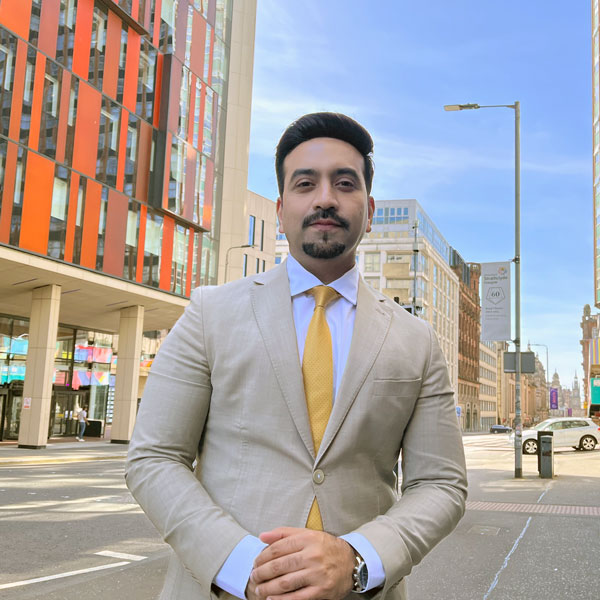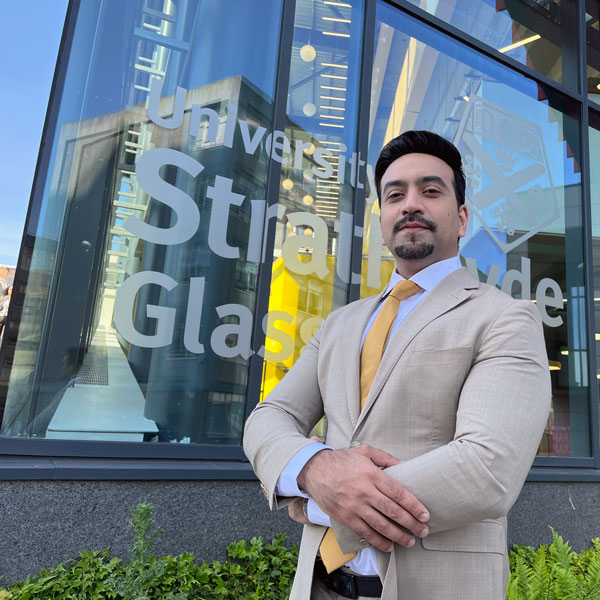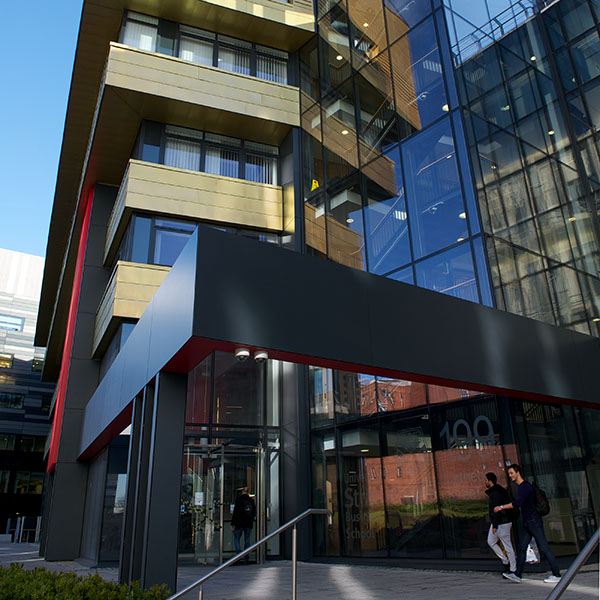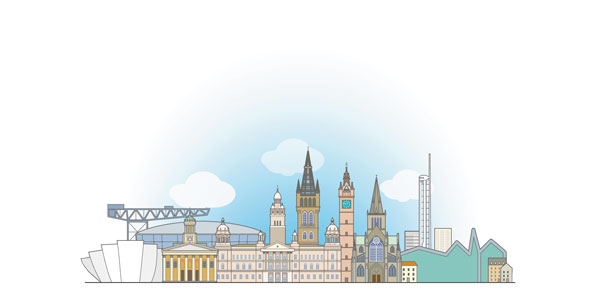Nabeel Qadeer
Nabeel Qadeer is an innovator playing a major role in Pakistan’s entrepreneurial landscape. After graduating in 2012 with an MSc in Business & Management from Strathclyde Business School, Nabeel has spearheaded initiatives such as Plan9 Tech Incubator and hosted Idea Croron Ka, Pakistan’s first business reality show.
In 2024, he was awarded the British Council Study UK Alumni Award in the Business and Innovation category. He currently spends time teaching entrepreneurship, leadership and self-development at leading business and IT schools of Pakistan.
Here, Nabeel talks about his time at Strathclyde, how he has used his learning and connections in his career, and offers advice to international students considering Strathclyde as an option.

Why did you decide to study in Scotland?
My decision to pursue a Masters degree came at a transitional phase in my life, a time when I needed to pause, reflect, and take a broader view before making key decisions. Scotland stood out to me for several reasons; its scenic beauty, the genuine warmth of its people, and the inclusive environment it offered. I believed it would give me the space, both physically and mentally, to reset and grow.
What truly sealed the decision was the practical and applied learning approach at Strathclyde Business School. It aligned well with what I was seeking at that stage in life.
What do you think about Strathclyde?

The teaching and learning environment at Strathclyde is truly reflective of its motto, "a place of useful learning". The curriculum is thoughtfully designed to blend research, theory, and practice within a global context, while also placing strong emphasis on personal development.
The programme structure itself stood as a testament to effective learning. Graded components like the Sitex Orbis simulation and a visit to the Cumbrae Islands as part of the Professional Development Programme were far more than academic exercises. They were immersive learning experiences that demonstrated how education can be engaging, relevant, and deeply impactful.
Altogether, Strathclyde cultivates not just knowledge, but also the skills, perspectives, and mindset needed to thrive in a complex and evolving world.
The friendships I formed have played a significant role in both my professional and personal life, and they continue to do so.
Technopsis, my first brand, was co-founded with a fellow programme participant I connected with early in the programme. Most of the relationships formed during this time were rooted in discussing ideas and exploring ways to solve societal challenges, primarily through technology and better management of existing resources.
I must also mention the critical role played by Dr Peter McInnes, our programme director. He has an extraordinary ability to identify what students need to grow. His guidance helped me embrace self-reflection, which in turn empowered me to improve, create impact, and strive to become the best version of myself.

What are the Strathclyde memories that stick with you? What has been particularly useful in your career?
The programme’s extraordinary curriculum design was distinctive. It created experiences that not only shaped our learning but left a lasting impact.
The Professional Development Programme, in particular, stands out. The Cumbrae Islands exercise was unique. It not only helped us build strong teamwork skills but also highlighted the value of empathy, leading by action, self-awareness, and character-building. Despite knowing we weren’t leading the board, my team pushed through. That experience taught us the true meaning of commitment and perseverance - and it paid off in the feedback and academic recognition we received.
Another key element was the Sitex Orbis project, which showcased the academic depth of the programme. That experience taught us about the dynamics of organisational behaviour, emotional intelligence, and what I call the "Four Es" - empathy, ego, esteem, and execution - in a real-world context.
What do you think about Glasgow?
It’s often said that “People make Glasgow” - and I truly found that to be the case. In this regard, I value the time spent at George Square, observing people, their interactions, and their sense of humour.
Glasgow is a welcoming, inclusive, and open city that takes great pride in its culture and heritage. The warmth and friendliness of its people create a supportive environment that makes it an enriching place to live and study, for both international and local students.
Another remarkable aspect of Glasgow is its diversity. While deeply rooted in its own culture, the city embraces people from all walks of life, making it home for a rich mix of communities.

What advice would you give to international students considering Strathclyde?
I would strongly recommend Strathclyde to international students for several reasons.
First, the university is designed to offer a powerful blend of research, theory, and practice, an approach that truly prepares you for the next stage of your professional and personal journey.
Second, Strathclyde has a strong international outlook, not just in terms of student diversity but also in its curriculum, case studies, exchange programmes, and global learning opportunities. These experiences help you develop a broader perspective and connect your learning with real-world global challenges.
Third, the university’s motto, ‘a place of useful learning’, is more than just a slogan. It reflects a culture that encourages students to make practical use of their education to create impact. As a student, you should embrace this mindset and actively seek ways to apply your learning to real-life problems.
Lastly, I would encourage incoming students to explore beyond their coursework. Engage with the development work Strathclyde is involved in, whether it's in clean energy, education, or technology. Think about how you can localise and implement what you learn, or even build partnerships with Scottish institutions to benefit your home country.